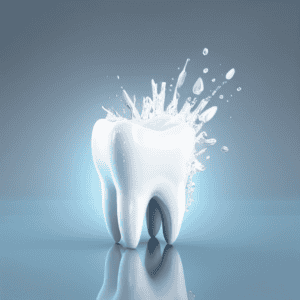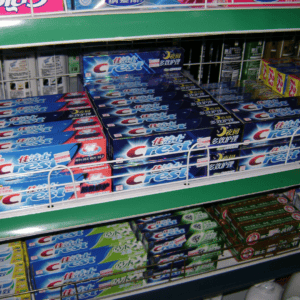Confused about the vast amount of toothpastes on offer? Or think that they are all the same and it doesn’t matter what you use? Not all toothpastes are created equal, and choosing the right toothpaste for your mouth is important. While its primary job is to keep our teeth clean and breath fresh, there’s more to toothpaste than meets the eye. Read on to find out which toothpaste is right for you.

What’s in Toothpaste?
The basic ingredients of toothpaste typically include abrasives, detergents, fluoride, flavors, and humectants. Abrasives like calcium carbonate or silica scrub away plaque and stains, detergents (such as sodium lauryl sulfate) create foam to help dislodge debris, fluoride strengthens tooth enamel, and humectants like glycerol keep the paste from drying out. Together, these ingredients ensure that brushing your teeth isn’t just a ritual but an effective way to maintain oral hygiene.
Beyond its cleaning powers, toothpaste plays a crucial role in preventing dental issues like tooth decay and gum disease. The fluoride in toothpaste strengthens enamel and helps repair early signs of tooth decay, while antibacterial agents help fight gum disease-causing bacteria. Some specialized toothpastes even cater to sensitive teeth, whitening, or specific dental conditions.
How Does Toothpaste Prevent Cavities?
Toothpaste prevents cavities primarily through its active ingredient, fluoride. Here’s how fluoride in toothpaste works to protect your teeth:
1. Strengthening Tooth Enamel: Fluoride helps to remineralise and strengthen tooth enamel, which is the outer layer of the tooth. Enamel is susceptible to demineralisation due to acids produced by bacteria in plaque and acids from sugary and starchy foods. Fluoride aids in reversing early stages of enamel damage caused by these acids, making the enamel more resistant to decay.
2. Inhibiting Acid Production: Fluoride inhibits the ability of bacteria in plaque to produce acids that attack tooth enamel. By reducing acid production, fluoride helps to prevent the demineralisation of enamel, which is the first step towards cavity formation.

3. Enhancing Remineralization: Fluoride promotes remineralisation, which is the process of minerals like calcium and phosphate being deposited back into weakened areas of enamel. This remineralisation process helps to repair early, microscopic stages of tooth decay before they progress into cavities.
4. Protecting Against Bacteria: Some toothpastes also contain antibacterial agents which help to reduce the amount of bacteria in the mouth, which can further prevent plaque buildup and reduce the risk of cavities and gum disease.
In addition to fluoride, toothpaste often contains abrasives that help mechanically remove plaque and food particles from teeth when brushing. The combination of fluoride and mechanical cleaning significantly reduces the likelihood of developing cavities when used as part of a regular oral hygiene routine that includes brushing at least twice a day and flossing.

How can toothpaste help with sensitive teeth?
Tooth sensitivity occurs when the underlying dentine of a tooth becomes exposed. Dentine is made up of tiny tubules that lead to nerve endings within the tooth. When these tubules are exposed—whether due to receding gums, enamel erosion, or dental procedures—stimuli such as hot, cold, acidic foods, or even brushing can trigger sharp, temporary pain.
Sensitive toothpaste is formulated to address tooth sensitivity by targeting the root cause of sensitivity. Unlike regular toothpaste, which focuses primarily on cleaning and preventing cavities, sensitive toothpaste contains active ingredients that help alleviate discomfort and protect exposed dentin.

How Sensitive Toothpastes Work
Desensitising Agents: Sensitive toothpastes can contain a range of ingredients such as potassium, calcium sodium phosphosilicate (CSP), strontium, arginine, and stannous fluoride (SnF2). These compounds work by blocking the pathways to the nerves, thereby reducing sensitivity over time.
Milder Abrasives: To maintain cleanliness without exacerbating sensitivity, these toothpastes use gentler abrasives compared to standard varieties.
Fluoride: Essential for preventing cavities, fluoride is also present in sensitive toothpaste formulations. It helps strengthen enamel and protects against decay, which can contribute to sensitivity.

Specialized Formulas: Some sensitive toothpastes are tailored to specific needs, such as those for whitening or gum health, ensuring you can find one that meets your oral care requirements.
Choosing a fluoride-containing toothpaste that meets your specific dental needs, such as sensitivity or whitening, and brushing correctly for at least two minutes each time, ensures that you’re maximizing the cavity-fighting benefits of toothpaste. Regular dental check-ups and professional cleanings also play a crucial role in maintaining optimal oral health.
Using Sensitive Toothpaste Effectively
For optimal results, follow these tips:
Consistency:
Use sensitive toothpaste consistently as your regular toothpaste to experience ongoing relief. It takes time for the active ingredients to build up and work. Give yourself at least a week before you expect results. Switching and changing to other toothpastes (even another sensitive toothpaste, but with a different active ingredient) can stop the compounds from working effectively.
Technique
- Brush gently using a soft-bristled toothbrush to avoid further gum recession and enamel wear
- We recommended getting an electric toothbrush with a pressure sensor – this will let you know if you are brushing too hard
- Think about massaging the gums, rather than scrubbing them
- Angle the bristles of the toothbrush down towards the gum-line
Consultation
If sensitivity persists or worsens, consult your dentist. It could indicate an underlying dental issue that needs addressing. Tooth sensitivity can mimic other dental issues, such as tooth decay.

How can toothpaste help with specific concerns
Your dentist can also recommend (and provide) toothpastes for specific concerns.
There are pharmacist only high strength fluoride toothpastes, which are recommended for those at higher risk of tooth decay. We also have some dental mousses with calcium and phosphate, which are other elements that make up tooth enamel. Those who are at high risk of decay due to for example, high sugar consumption, dry mouth, reduction in quality of saliva, or specific medical treatment which puts them at higher risk from decay will be recommended these specific products.

There are also specific toothpastes recommended for those with specific gum issues and/or sores in their mouths. These can contain ingredients such as chlorhexidine. In addition, if a reaction or allergy to SLS is suspected, SLS free toothpastes will be recommended.
What about whitening toothpastes
There are few toothpastes out there that actually whiten the teeth. The majority of ‘whitening’ toothpastes contain stronger abrasives that are designed to essentially scratch stains off the teeth. This may help with superficial staining, but may also be too harsh on the tooth enamel and dentine, especially if you suffer from tooth wear and/or gum recession.

There are some toothpastes that contain some whitening products in them, namely hydrogen peroxide. Again, this will lift stains and may maintain whiteness for those who have whitened their teeth before, and even very slightly whiten the teeth However, please bear in mind that when professionally whitening your teeth, we used custom-fitted mouthguards which hold the tooth whitening products as close to the teeth as possible for a minimum of around 30 minutes. A two minute brush with some toothpaste won’t work to the same degree.
Choosing the Right Toothpaste for You

When selecting a toothpaste, consider the following factors:
Specific Ingredients
- If you have sensitivity and worn down teeth (from grinding or over-brushing), look for toothpastes containing calcium sodium phosphosilicate (CSP), strontium, arginine.
- If you have tooth sensivitiy, a dry mouth and have erosion (from dietary acids or reflux), look for toothpastes containing stannous fluoride or phosphate.
- If you have inflamed gums or are at risk of gum disease, look out for antibacterial agents like triclosan or zinc compounds
Try to avoid whitening toothpastes – as the majority of these have abrasives, which can wear the teeth further and cause more sensitivity and yellowing.
Please speak to us for alternative whitening toothpaste recommendations.
Fluoride
Most popular brands will contain either Sodium Fluoride and / or Stannous fluoride. For adult toothpastes this is around 1,450ppm (parts per million).
If you don’t want to use a fluoride toothpaste, look out for xylitol instead.
Other types of toothpastes and mousses.
We can sometimes recommend higher strength fluoride toothpastes. These are good if you have extreme sensitivity, have had dry mouth from medical conditions/treatment (e.g. chemo- and radiotherapy) or have had a lot of decay experience.
Mousses e.g. Tooth Mousse, can also be recommended for people who have low saliva, erosion and sensitivity. When combined with stannous fluoride, studies have shown this combination to provide superior protection against acids from your diet or gastrointestinal system.
Personal Preference
The rest is really personal preference: Such as textures and flavours.

In Summary
Next time you reach for your toothpaste, consider the specific needs of your teeth. Here at Dentistry on George we like to give you individualised and tailored advice specific to your needs. We can certainly recommend the best toothpaste for you. Mishari’s favourites are the Sensodyne range, especially Repair and Protect and the Rapid Relief Extra Fresh.



